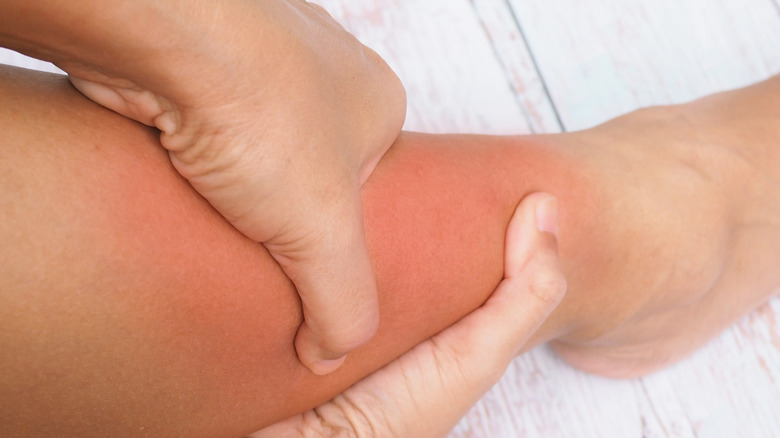You Might Have Cellulitis If This Happens To You
If you've seen that "orange peel skin" on your thighs or someone else's, then you're familiar with cellulite. Many people confuse cellulite with cellulitis, however, even though the two are not the same thing. According to Medicine Net, cellulite is formed when fat is deposited between the connective tissue under the skin. This causes the skin to look dimpled or lumpy. You may not like the appearance of cellulite, but it's harmless and not a cause for concern. Cellulitis, on the other hand, is a bacterial skin infection that can become life-threatening
According to the book "Cellulitis," more than 14 million cases of this condition show up every year in the U.S. The most common bacteria that cause cellulitis are staphylococcus and streptococcus. Most commonly, cellulitis is seen on the lower leg, but bacteria can enter the body via a cut, wound, or anywhere that the skin is broken. If cellulitis is left untreated, the infection can spread throughout the body via the lymph nodes or blood stream, causing a serious illness or even death (via Mayo Clinic). Knowing the signs and symptoms of cellulitis can help you seek treatment that could save your life.
The first sign of cellulitis may be changes in skin color
With so many skin conditions in existence, how can you tell if you have cellulitis? If you've had a recent bug bite, cut, or skin irritation that is getting worse, it could be cellulitis. According to Healthline, the first sign of cellulitis may be painful skin that looks discolored and swollen.
With cellulitis, the discoloration and swelling don't go away on their own, and it quickly spreads across the affected area (per Healthline). Depending on your skin tone, the discoloration may appear bright red or dark brown. The increased swelling and inflammation make your skin feel tight and appear shiny. If you have an abscess that has pus coming from it, that is a sign that there is an infection present.
Although anyone with a cut or breakage of skin can contract cellulitis, some conditions put you more at risk. You can be vulnerable to cellulitis infection if you are overweight, diabetic, have a weak immune system, experience chronic swelling of your limbs, or inject medications or drugs. Practicing good wound care can help prevent cellulitis (via Centers for Disease Control and Prevention).


